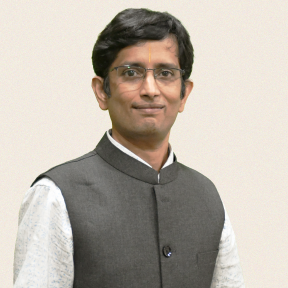
Prof. Satyanarayanan S
Associate Professor,
Indian Institute of Technology Madras
:
Satyanarayanan S

Prof. Satyanarayanan Seshadri is with the Department of Applied Mechanics at the Indian Institute of Technology Madras and leads the Energy and Emissions Research Group (EnERG). His work focuses on developing practical technologies for energy efficiency and emissions mitigation in industrial systems. He holds a Ph.D. in Mechanical Engineering from Texas A&M University and brings industry experience from GE Global Research and Forbes Marshall.
Prof. Seshadri's research spans waste heat recovery using Organic Rankine Cycles, thermodynamic and economic optimization of energy use in process industries, aerosol technology, and in-situ emissions monitoring. His work on particulate measurement techniques in moist flue gases addresses critical challenges in industrial stack emission regulation. He has also contributed to the design of expanders for power recovery from industrial waste heat and pressure.
A key theme in his work is bridging academic research with industry needs. He has collaborated with organizations like the Southern India Chamber of Commerce and Industry (SICCI) and the Confederation of Indian Industry (CII) to promote energy audits, policy dialogues, and technology adoption. Through initiatives such as the Industrial Energy Assessment Cell (IEAC) and the Center for Technology and Policy (CTaP), he supports ongoing efforts in energy benchmarking and sustainability assessments.
Prof. Seshadri is also actively involved in innovation mentorship as a faculty advisor to the Nirmaan pre-incubation center at IIT Madras. His commitment to applied research and energy sustainability makes him a strong contributor to the themes of ECM 2025.
Title: A framework for actioning energy efficiency in manufacturing and process Industries:
Case studies from the Dairy Industry
Achieving deep decarbonisation in manufacturing requires more than isolated energy audits; it calls for a resource-centric perspective that treats every utility stream as an investment portfolio. We present a “CHEAW-M” framework that organises opportunities around six pillars—Cooling, Heating, Electricity, compressed Air, Water and Materials—and converts them into finance-ready projects for plant managers and lenders alike.
The five-step cycle begins with high-resolution metering and mass-energy balances that allocate baseline consumption to each pillar. Opportunity screening then employs a dual track: a validated library of proven measures (e.g., chiller sequencing, heat-pump retrofits) and frontier trials such as membrane deaeration for boilers. Measures are classified by simple-payback bands (<3, 3–24, >24 months) and bundled so that quick wins underwrite longer-horizon investments.
Application across nine plants of a leading dairy in India demonstrates the framework’s utility. Validated projects deliver INR 300 lakh/year, with an additional INR 146 lakh/year in experimental measures. Cooling dominates quick wins (43 % of savings) through chilled-water reset and condenser-pressure optimisation, while Heating opportunities (26 %) include condensate recovery and low-lift heat pumps. Electricity measures—high-efficiency motors and LED retrofits—provide another 18 %, and compressed Air leak fixes pay back in weeks. Water recycling and material-stream reductions contribute the remainder but unlock co-benefits in wastewater fees and product loss. Collectively, the portfolio trims site electricity by 9 % and averts ≈ 5,600 t CO₂ /year, equivalent to removing 2,800 cars from India’s roads.
The CHEAW-M framework thus translates the “efficiency-first” mantra into a replicable, data-rich pathway for net-zero manufacturing, readily extendable to beverages, cold-chain logistics and broader agro-processing sectors nationwide.